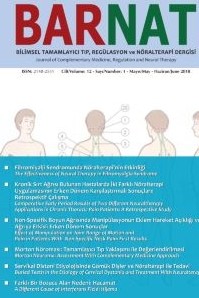TOTAL KALÇA ARTROPLASTİSİ SONRASI NÖRALTERAPİ UYGULAMASI: ÖN ÇALIŞMA
Giriş: Ağrıveeklemhareket kısıtlılığı total kalçaartroplastisi sonrasıgörülebilecekkasiskelet sistemiproblemlerindendir.Totalkalça artroplastisi olan hastaların rehabilitasyon süreci ve dolayısıyla eklem hareket açıklığı ağrıdan etkilenmektedir. Nöralterapi lokal anes- tezik enjeksiyonlarının tanı ve tedavi amacıyla kullanıldığı tedavimodalitesidir. Lokal anestezikler bu bağlamda ağrıyı kontrol altına almak ve otonomsinir sisteminde regülasyonu sağlamak amacıyla kullanılır.Uzun dönemde sorunu ortadan kaldırarak ağrıyı rahat- latmak, fonksiyonelliği artırmak amacıyla kullanılır.Genel olarak lokal enjeksiyonlar ve segmental enjeksiyonlara ek olarak ganglion enjeksiyonlarını da içermektedir.
Materyal-method: 50-65 yaş arasında 12 total kalça artroplastili hasta çalışmaya dahil edildi. Tümenjeksiyonlarda 5/1000 lik pro- kainsolüsyonuaynı araştırmacı tarafından uygulandı.Lokalenjeksiyonlar,T9-L2segmentalenjeksiyonlar,Kalçaorijinli kasların tetik noktaenjeksiyonlarıher seanstauygulandı. 4seans2haftaya yayılmış şekilde uygulandı.Hastalar girişteveseanslarınbitiminden1 ay sonra değerlendirildi. Eklem hareket açıklığı (EHA) ölçümü gonyometre ile, ağrı değerlendirmesi vizüel analog skala (VAS) ile ve sonolarakdafonksiyonellikvesağlık ilişkili yaşamkalitesinideğerlendirmekamacıylashort form-36(SF-36)kullanıldı.
Bulgular: Nöralterapi seansları sonrasıVASveEHAanlamlı olarak gelişme gösterdi (p<0.05).Mental sağlık ve enerji/yorgunluk alt grupları hariç diğer tüm SF-36 alt gruplarında başlangıca kıyasla nöralterapi sonrası anlamlı gelişme saptandı.
Sonuç: Rehabilitasyon süreci boyunca total kalça artroplastisi hastalarında nöral terapi bakış açısıyla uygulanan lokal anestezik enjeksiyonu kısa dönemde ağrıyı azaltma ve eklem hareket açıklığını artırmada etkili görünmektedir.Geniş serili çalışmalara ihtiyaçvardır.
Anahtar Kelimeler:
Total kalça artroplastisi, Rehabilitasyon, , Eklem hareket açıklığı, ağrı, nöralterapi
NEURALTHERAPY APPLICATION AFTER TOTAL HIP ARTHROPLASTY: PRELIMINARY STUDY
Introduction: Pain and limitation of range of motion can occur after total hip arthroplasty. Rehabilitation procedure is effected by painaccordingly range ofmotion.Neuraltherapy (NT) isa treatmentmodality usinginjections withlocal anesthetics fordiagnosis and therapy.Localanesthesicsarewidelyusedtomanagepainandbalanceautonomicnervoussystem.Itisutiliziedtoimprovefunction,re- lievepainin longtermfollow-upbyeliminatingdisorder.NTconsists of local, segmental injectionsandadditionallyganglioninjections. Material and methods: 12 patients between 25-65 years with total hip arthroplasty are included the study. 5/1000 solution of procaine is used for all injections by the same physician. Local injections, T9-L2 segmental injections and trigger point injections of hip relatedmuscles are applied in each session. 4 sessions are planned in 2weeks time. Patients are evaluated at the beginning andafter amonth periodasfromthecompletionof all sessions.Evaluationisdoneby goniometer toassess rangeofmotion(ROM). Painis detected by visualanalog scale(VAS)andeventually,Short form-36(SF-36) is usedto evaluatehealthrelatedquality of life. Results:VAS,ROMareall improvedsignificantlyafterneural therapy sessions (p<0.05).SubgroupsofSF-36exceptmentalhealth and vitality showed significantly difference after neural therapy sessions.
Conclusion: Local anesthesic injectionwith the perspective of neural therapy in patientswith total hip arthroplasty during rehabilita- tion procedure seems to be effective in pain and range ofmotion in short termfollow-up. There is need for further extended studies.
Keywords:
Total hip arthroplasty, Rehabilitation, Neural therapy, Pain,
___
- 1. Lespasio MJ, Sultan AA, Piuzzi NS, et al. Hip Osteoarthritis: A Primer. Perm J. 2018;22:17-084.
- 2. Rees HW. Management of Osteoarthritis of the Hip. J Am Acad Orthop Surg. 2019. doi: 10.5435/JAAOS-D-19-00416.
- 3. Coulter CL, Scarvell JM, Neeman TM, Smith PN. Physio-therapist-direc- ted rehabilitation exercises in the outpatient or home setting improve strength, gait speed and cadence after elective total hip replacement: A systematic review. J Physiother. 2013;59:219–26.
- 4. Freburger JK. An analysis of the relationship between the utilization of physical therapy services and outcomes of care for patients after total hip arthroplasty. Phys Ther. 2000;80:448–58.
- 5. Classen T, Zaps D, Landgraeber S, Li X, Jäger M. Assessment and mana- gement of chronic pain in patients with stable total hip arthroplasty. Int Orthop. 2013;37:1-7.
- 6. Umpierres CS, Ribeiro TA, Marchisio ÂE, et al. Rehabilitation following total hip arthroplasty evaluation over short follow-up time: randomized clinical trial. J Rehabil Res Dev.2014;51:1567-78.
- ISSN: 2148-2551
- Başlangıç: 2006
- Yayıncı: Bilimsel Nöralterapi ve Regülasyon Derneği
Sayıdaki Diğer Makaleler
Fatma URAL NAZLIKUL, Ezgi AYDIN, Hüseyin NAZLIKUL
GİRİŞİMSEL İŞLEM UYGULANAN OMUZ AĞRILI HASTALARIN DEMOGRAFİK VE KLİNİK ÖZELLİKLERİ
Şule ŞAHİN ONAT, Elif UMAY ALTAŞ
TOTAL KALÇA ARTROPLASTİSİ SONRASI NÖRALTERAPİ UYGULAMASI: ÖN ÇALIŞMA
Hüma BÖLÜK ŞENLİKCİ, Fatma URAL NAZLIKUL
LOKOMOTOR SİSTEM HASTALIKLARINDA KAYROPRAKTİK YAKLAŞIMLAR
Hüseyin NAZLIKUL, Fatma Gülçin URAL NAZLIKUL, Sibel ÇAĞLAR OKUR, A TÜRK, Cüneyt TAMAM, Ferda FİRDİN, Yusuf TAMAM
EL CERRAHİSİ SONRASI GELİŞEN DİJİTAL KONTRAKTÜRDE AKUPUNKTUR UYGULAMASI
